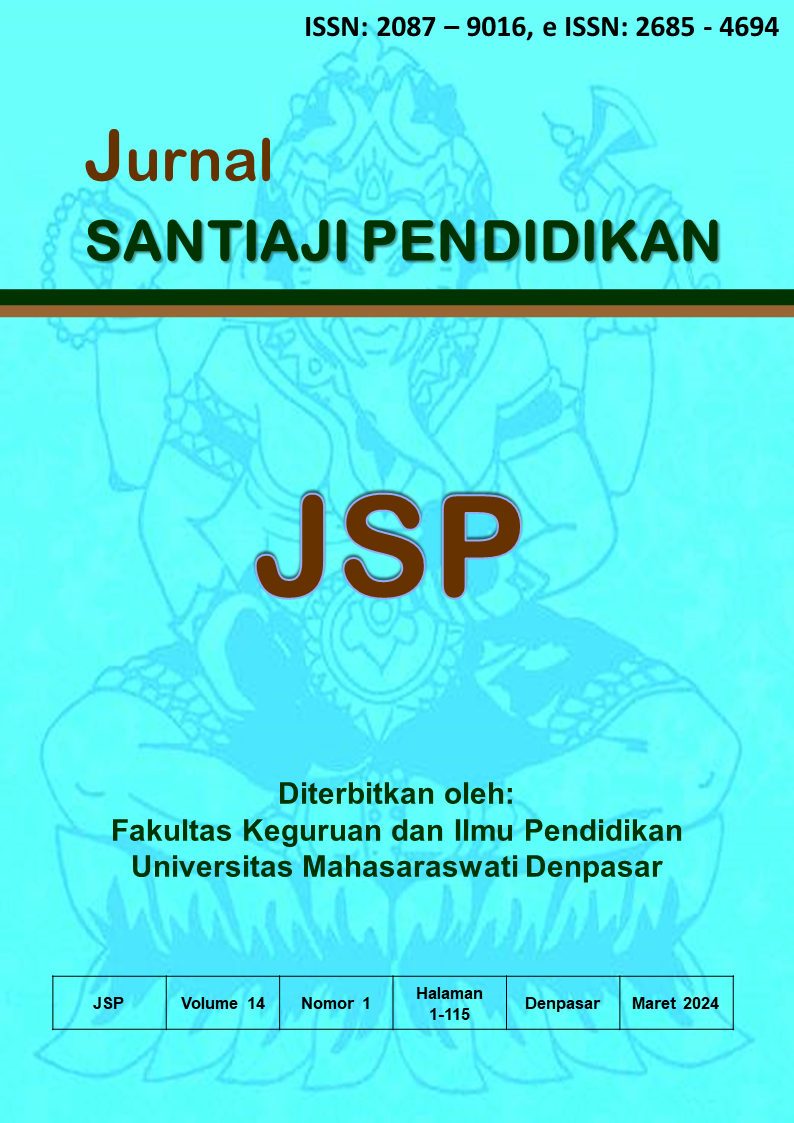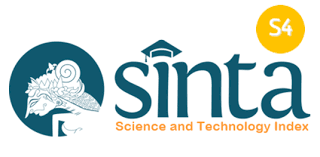ERROR ANALYSIS OF NON-ENGLISH STUDENTS IN ENGLISH PRESENTATION: ITS EVIDENCE AND PERCEPTION
DOI:
https://doi.org/10.36733/jsp.v14i1.8730Keywords:
Bahasa Inggris Sebagai Bahasa Pengantar, Kesalahan, PerasaanAbstract
Penggunaan bahasa Inggris sebagai bahasa pengantar dalam proses pembelajaran menjadi tren global dan tuntutan di sektor pendidikan. Namun, memiliki kemampuan dalam berbahasa Inggris bukan berarti tidak adanya kesalahan saat menggunakan dalam proses pembelajaran. Penelitian ini berfokus pada kesalahan siswa dalam menggunakan Bahasa Inggris saat presentasi. Penelitian ini bertujuan: (1) untuk mengetahui kesalahan tata bahasa umum terjadi ketika siswa melakukan presentasi dalam bahasa Inggris; dan (2) untuk mengetahui perasaan dalam menggunakan bahasa Inggris. Desain penelitian kualitatif digunakan dalam penelitian ini. 40 mahasiswa program studi pendidikan Biologi menjadi subjek penelitian. Mereka berpartisipasi untuk mengisi kuesioner. Empat rekaman video presentasi diunggah ke YouTube sebagai data penelitian. Data kesalahan tata bahasa siswa juga dikumpulkan dan dianalisis. Hasil penelitian menunjukkan bahwa: (1) siswa mampu melakukan presentasi dalam bahasa Inggris namun melakukan kesalahan dalam tenses, pemilihan kata, dan kata benda tunggal/jamak; (2) kecemasan terjadi ketika mereka berbicara bahasa Inggris. Penelitian ini menyiratkan bahwa siswa memerlukan kursus bahasa Inggris intensif untuk memperkuat bahasa Inggris dasar mereka.
Downloads
References
Alhalwaki, H., & Hamdan, A. M. M. (2019). Factors affecting the implementation of internationalization strategies in higher education institutions: evidence from Bahrain. International Journal of Management in Education, 13(1), 1-27. Available online: https://www.inderscienceonline.com/doi/abs/10.1504/IJMIE.2019.096474
Batu, P. N., Puspitasari, L., Barasa, L., & Sitepu, V. T. (2018). Grammatical Errors in Students Speaking English: An Error Analysis on. Asian EFL Journal, 20(7).
Curdt-Christiansen, X. L., Gao, B., & Sun, B. (2021). How to kill two birds with one stone: EMI teachers’ needs in higher education in China. Applied Linguistics Review. https://doi.org/10.1515/applirev-2021-0178
Curle, S., Yuksel, D., Soruç, A., & Altay, M. (2020). Predictors of English Medium Instruction academic success: English proficiency versus first language medium. System, 95, 102378. https://doi.org/10.1016/j.system.2020.102378
Daud, A., Ras, F., Novitri, N., & Audia, C. P. (2019). Factors contributing to speaking anxiety: a case study of pre-service English teachers. Journal of Educational Sciences, 3(3), 412-422. doi: https://doi.org/10.31258/jes.3.3.p.412-422
de Wit, H., & Altbach, P. G. (2021). Internationalization in higher education: global trends and recommendations for its future. Policy Reviews in Higher Education, 5(1), 28-46. https://doi.org/10.1080/23322969.2020.1820898
Ekoç, A. (2020). English Medium Instruction (EMI) from the perspectives of students at a technical university in Turkey. Journal of Further and Higher Education, 44(2), 231–243. https://doi.org/10.1080/0309877X.2018.1527025. Available online: https://www.tandfonline.com/doi/abs/10.1080/0309877X.2018.1527025
Ellis, R. (1985). Understanding Second Language Acquisition. Oxford: Oxford University Press.
Galloway, N., Kriukow, J., & Numajiri, T. (2017). Internationalization, higher education and the growing demand for English: An investigation into the English medium of instruction (EMI) movement in China and Japan.
Gass, S. and Selinker, L. (2001). Second Language Acquisition: An introductory course. 2nd Ed. London: Lawrence Erlbaum Associates.
Ho, B., & Ho, K. K. (2004). The developmental trend of the medium of instruction in secondary schools of Hong Kong: Prospect and retrospect. Language and Education, 18(5), 400-412. https://doi.org/10.1080/09500780408666891
Ismail, I., & Tini, T. (2020). The effect of formative assessment on students’ grades in learning English. MAJESTY JOURNAL, 2(1), 20–30. https://doi.org/10.33487/majesty.v2i1.315
Kewara, P., & Prabjandee, D. (2018). CLIL teacher professional development for content teachers in Thailand. Iranian Journal of Language Teaching Research, 6(1), 93–108. https://doi.org/10.30466/IJLTR.2018.20492
Kexin, H. (2019). Follow-up Course Construction of College English Based on Vocational Applied Ability.
Lado, R. (1957). Linguistics across Cultures: Applied Linguistics for language teachers. Ann Arbor, Michigan: University of Michigan.
Lightbown, P. & Spada, N. (1999). How languages are learned. Oxford: Oxford University Press.
Margić, B. D., & Vodopija-Krstanović, I. (2018). Language development for English-medium instruction: Teachers’ perceptions, reflections and learning. Journal of English for Academic Purposes, 35, 31-41. https://doi.org/10.1016/j.jeap.2018.06.005. Available online: https://www.sciencedirect.com/science/article/pii/S1475158518302200
Pramerta, I. G. P. A., Ratminingsih, N. M., Putra, I. N. A. J., Santosa, M. H., Artini, L. P., & Adnyani, N. L. P. S. (2023). Voices of Non-English Students and Teachers in English as a Medium of Instruction. International Journal of Learning, Teaching and Educational Research, 22(3), 491-509. https://doi.org/10.26803/ijlter.22.3.29
Qiong, H. X. (2004). Why China English should stand alongside British, American, and the other ‘world Englishes’. English Today, 20(2), 26–33. https://doi.org/10.1017/S0266078404002056
Rashid, B. T. (2015). Error analysis of Kurdish EFL undergraduate learners' accuracy in speaking English language. International Journal of Language and Linguistics, 3(6), 448–454.
Rhodes, S. (2018). The global trend towards English-medium instruction: A literature review on EMI/CLIL in a Swedish and European perspective.
Sari, R. A. (2018). Students’ grammatical error analysis in speaking. Edukasi: Jurnal Pendidikan dan Pengajaran, 5(2), 127-137. Available online at http://jurnal.radenfatah.ac.id/index.php/edukasi
Simbolon, N. E., Oliver, R., & Mercieca, P. (2020). Lecturers' perceptions of English medium instruction (EMI) practice at a university in Indonesia. Pertanika Journal of Social Sciences & Humanities, 28(2). Available online: http://www.pertanika.upm.edu.my/
Tight, M. (2021). Globalization and internationalization as frameworks for higher education research. Research Papers in Education, 36(1), 52-74. https://doi.org/10.1080/02671522.2019.1633560
Valeika, L., & Buitkienė, J. (2003). An introductory course in theoretical English grammar.
Weinreich, H. (1953). Languages in contact: Findings and Problems. New York: Linguistic Circle of New York.
Downloads
Published
Issue
Section
License
Copyright (c) 2024 I Gde Putu Agus Pramerta

This work is licensed under a Creative Commons Attribution 4.0 International License.











